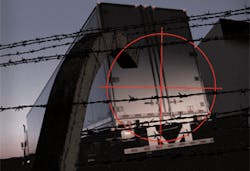The deaths and injuries caused by a series of terrorist attacks on the London, England transit system today are putting a fresh spotlight on transportation security efforts here in the U.S.
“A lot of people have felt our organization has focused too much on the potential for terrorism in transportation and not enough on cargo theft – but now I think we’ve been vindicated in that approach,” Joe baker, president of the Annapolis, MD-based International Cargo Security Council, told Fleet Owner.
“What we have to remember is that cargo theft and terrorism go hand in glove – because if removing something from a cargo container can be done, then it’s just as easy to put something in to blow the smithereens out of it,” he said. “[The bombings in London] show that transportation remains a target for terrorism,” Baker added.
“This is the kind of incident our training is designed to help prevent,” John Willard, spokesman for the Alexandria, VA-based Highway Watch program told Fleet Owner. “In fact, we provide training to [transit] bus and subway workers specifically to cover situations where an event like what has occurred in London can happen.”
Willard spoke from a Petro truck stop located just north of Richmond, VA, where Highway Watch – a trucking security organization funded by a grant from the Department of Homeland Security (DHS) and operated under the auspices of the American Trucking Assn. (ATA) – was filming a new training video.
“One of the vehicles we’re using in our new film is a transit bus and details what bus drivers should do if they spot a suspicious passenger,” Willard explained. “We’re trying to help bus drivers be more aware of their environment and what their passengers bring on the vehicle – and how to react if passengers leave something, such as a bag or parcel, behind.”
The London bombings triggered widespread alerts for transit agencies across the U.S., spurred in part by President George W. Bush, who is attending the G8 economic summit in Edinburgh, Scotland.
“I have been in contact with our Homeland Security folks [and] I instructed them to be in touch with local and state officials about the facts of what took place here and in London, and to be extra vigilant as our folks start heading to work,” the President said. “The war on terror goes on.”
“The Dept. of Homeland Security has stood up the Interagency Incident Management Group to ensure full situational awareness around this incident and in the United States,” said Secretary of Homeland Security Michael Chertoff. “We do not have any specific intelligence indicating this type of attack is planned in the United States, but we are constantly evaluating both intelligence and our protective measures and will take whatever actions are necessary.”
Back in the U.S., the Washington D.C. Metropolitan Transit Agency increased security at subway stations, commuter trains and buses as a result of the London bombings.
“We are taking precautionary measures to assure our customers that we are doing everything that we can to make sure that they can use our system without incident,” said Metro Transit Police Chief Polly Hanson. “[People] are likely to see our special response teams of officers carrying additional weaponry with a canine accompanying them. We also are asking our customers to be an extension of our eyes and ears, and let us know if they see anything unusual.”
Metro Transit Police noted that they deployed the special response teams and explosive detection canine teams to conduct sweeps of subway stations, trains and buses in the nation’s capital. “The presence of our special response teams and explosive detection canine teams does not indicate any specific, impending danger,” Chief Hanson explained. “These are precautionary measures intended to add another layer of security protection.”
Claims of responsibility for the bombings by an Islamic terrorist group related to Al Queda did not surprise security experts. Michael Clarke, director of the Center for Defense Studies at King’s College in London, told the Christian Science Monitor that the six or seven bombs used in this incident would mean at least 24 people were involved in planting them in a targeted operation.
The bombings also put the spotlight on recent transportation funding cuts made in June. American Public Transportation Association (APTA) president William Millar has called on Congress to restore that funding as those cuts created what he called a “major step backward” in protecting the safety of millions of daily public transit riders.
“In fiscal year 2005, Congress provided $150 million for transit and rail security grants … but the Senate Committee on Appropriations reduced the transit and rail security grants to $100 million when it approved the fiscal year 2006 Homeland Security Appropriations bill,” he said. “APTA is very concerned about the impact of this $50 million cut, and the consequences it will have for our nation’s transit security.”
Millar noted that since September 11, 2001, the federal government has spent $18 billion on aviation security, but only $250 million on transit security. Americans take public transportation 32 million times a day – totaling 9.6 billion trips in 2004 – that is 16 times more than they travel on domestic airlines, he said.
About the Author
Sean Kilcarr
Editor in Chief
Sean Kilcarr is a former longtime FleetOwner senior editor who wrote for the publication from 2000 to 2018. He served as editor-in-chief from 2017 to 2018.
